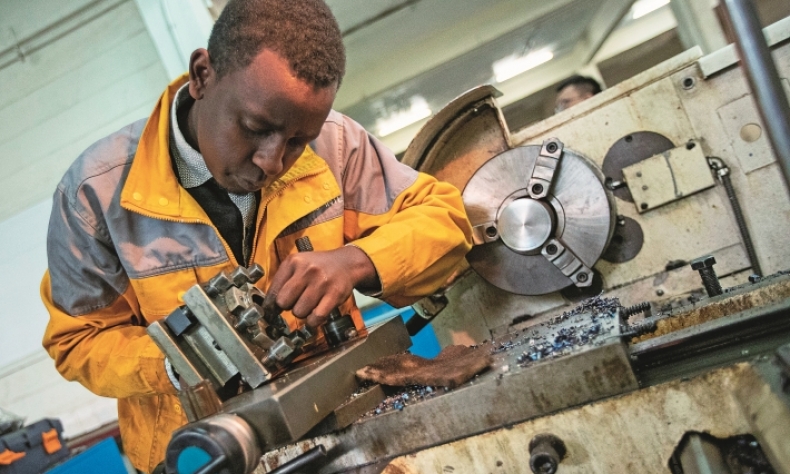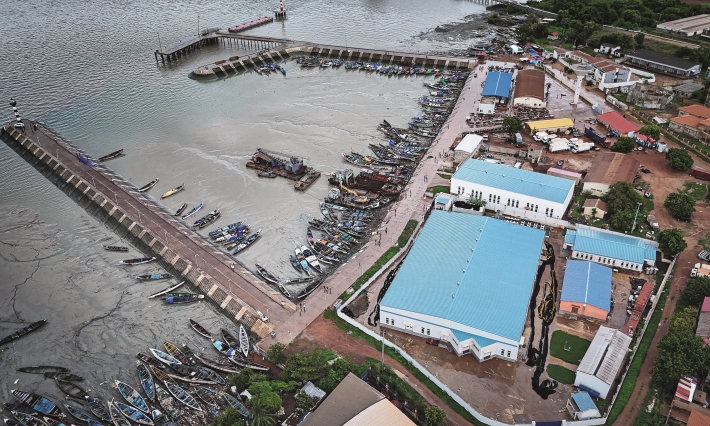Engines of Advancement

Chinese investment in Africa has boosted the continent’s economic growth and accelerated its industrialization.
Hasnaine Yavarhoussen, CEO of Groupe Filatex, the leading private energy producer in Madagascar, travelled to Beijing on the occasion of the 2024 Summit of the Forum on China-Africa Cooperation (FOCAC). As a key economic player in Madagascar and the African continent, Groupe Filatex participated in this high-level forum as part of the official Malagasy economic delegation. This participation also allowed Groupe Filatex to explore new partnership opportunities in its areas of strategic expertise across the African continent.
Yavarhoussen notably attended the signing of a partnership agreement between the Malagasy government and a Chinese company specialising in the energy sector. In Madagascar, electricity production, which is still largely dependent on fossil fuels, suffers from technical losses estimated at around 35 percent on the grid. In this context, Groupe Filatex is actively contributing to national efforts to modernise the electrical grid, aiming to reduce these losses to 5 percent. “The industrialisation of Madagascar cannot occur without more affordable electricity and a significant improvement in service quality,” Yavarhoussen told ChinAfrica.
Groupe Filatex, which has been collaborating with Chinese companies for several years, is a prime example of pragmatic China-Africa cooperation. In his speech at the opening ceremony of the FOCAC Summit in Beijing on 5 September, Chinese President Xi Jinping said, “Mutually beneficial cooperation is the right way forward, in line with the fundamental and long-term interests of all countries. China is willing to deepen cooperation with Africa in areas such as industry, agriculture, infrastructure, trade and investment.”
Chinese investment in Africa has boosted the continent’s economic growth and accelerated its industrialisation, according to the Report on Chinese Investment in Africa 2024, released on 23 August by the China-Africa Business Council (CABC). The report is based on numerous field surveys conducted by Chinese and African research and consulting institutions.
Expansion of investment areas
According to the Chinese Ministry of Commerce (MOFCOM), China’s stock of direct investment in Africa exceeded $40 billion by the end of 2023, making it one of the most important sources of foreign investment in Africa. Over the past three years, Chinese companies have created more than 1.1 million local jobs. The industrial parks they have invested in, such as Lekki in Nigeria and TEDA Suez in Egypt, cover agriculture, processing and manufacturing, and trade logistics, among other areas. These zones have attracted more than 1,000 companies, contributing significantly to local tax revenues and foreign exchange earnings through exports.
According to the CABC report, infrastructure is a key enabler of industrialisation. A study by the International Finance Corp. estimates that Sub-Saharan Africa needs to invest around 7.1 percent of its GDP in infrastructure each year to meet its sustainable development goals, while the actual level of investment in 2023 was just 3.5 percent. Against this backdrop, infrastructure investment has become an important issue for China-Africa industrial cooperation. According to MOFCOM, the scale of cooperation in this area exceeds $37 billion per year, contributing to Africa’s industrialisation and economic diversification.

In the transport sector, Chinese companies have built several highways, railways and port projects, which have significantly improved intra-African logistics efficiency, reduced logistics costs, and promoted industrialisation and regional integration in the continent. For example, the Mombasa-Nairobi Railway has enabled Kenya to reduce logistics transport costs by more than 40 percent, contributing to the development of the local economy.
According to the report, Chinese investment projects in Africa have gradually diversified beyond traditional sectors such as construction, mining, power and engineering, into emerging areas such as the digital economy, green development and financial services. This diversification is helping Africa to improve the resilience and competitiveness of its economy, while providing more investment opportunities for Chinese companies.
Mustafa Rawji, managing director of Rawbank, the leading private bank in the Democratic Republic of the Congo, told ChinAfrica, “What we are seeing is more Chinese investment in technology. China is gradually continuing to export its technology to set up telecommunications networks and data centres in Africa.” His view is echoed in the CBAC report, which states that these investments have not only improved cyber infrastructure in African countries, but also promoted the construction of digital infrastructure, thereby stimulating the digitalisation and upgrading of African industries.
Chinese companies, at the forefront of industrialisation in Africa, are also training the technicians needed for local production. Huawei, for example, has invested more than $150 million in talent training programmes covering more than 150 countries, including African countries, and benefitting more than 1.54 million people. These programmes have not only provided human resources for Huawei’s business expansion in Africa, but also created a pool of industrial talent with professional skills and innovative spirit, the report says.
In this process, local knowledge plays a key role in the introduction of Chinese investment. African countries are very diverse in terms of national conditions, which poses a major challenge for Chinese companies operating there. These differences highlight the importance of local knowledge for business development.
“For companies wanting to invest in Africa, it is essential to know the terrain. You have to rely on local chambers of commerce to get all the information you need to set up,” Mbuyi Junior, founder and CEO of JPG Consulting Partners Group, told ChinAfrica. With local knowledge, Chinese investors can better understand the local legal system, adapt to the African market and investment rules, and reduce legal risks. At the same time, they can better respect local cultures and traditions, ensuring that projects run smoothly.
Meeting African demand
Africa’s greatest export potential lies in the processing of natural resources. According to a report in People’s Daily, the continent is rich in mineral resources, accounting for 23 percent of the world’s total. But the production value of these resources only accounts for 9 percent of the global total. Against this backdrop, several African countries have introduced reforms to encourage local processing of minerals and value addition.

According to MOFCOM, the stock of Chinese direct investment in African mines was expected to reach $9.99 billion by the end of 2021, accounting for 22.6 percent of total Chinese investment in Africa. Chinese companies are building a mining supply chain in Africa, including research, exploration, extraction, processing and sales, in particular by creating integrated upstream and downstream industrial parks to increase the added value of local processing, the report said.
In an interview with ChinAfrica, Niger’s ambassador to China Garba Seyni stressed that “one of the most important China-Nigerien projects is the development of the Agadem field by China National Petroleum Corp., making Niger an oil producer.” The construction of a 2,000-km pipeline linking Niger’s oil fields to the port of Benin illustrates the scale and ambition of Chinese investment in Niger’s energy sector. But the cooperation with China is not limited to the oil industry; it also extends to the uranium and cement sectors, demonstrating the diversity of Chinese investment in Niger.
Industrialisation of the manufacturing sector has been at the top of Africa’s development agenda for decades. The African Union’s Agenda 2063 emphasises the importance of manufacturing, particularly regional manufacturing hubs, in transforming African economies.
According to MOFCOM, China has been steadily increasing its investment in manufacturing in Africa, with direct investment amounting to $400 million per year. Chinese investment is increasingly focused on market needs and industrial development trends, or “market-oriented investment.” Chinese companies are taking full advantage of Africa’s resource and labour advantages to create local production bases and manufacture products tailored to local market needs.
In addition to labour-intensive industries, Chinese companies are investing in high-tech sectors such as health, pharmaceuticals, new energy and electronic information, thereby boosting China-Africa economic and trade cooperation.
In recent years, African countries have been accelerating their economic development, gradually charting a course for African-style modernisation and building Africa into a peaceful and prosperous continent. In this process, Chinese enterprises are willing to accompany Africa on its modernisation journey, the report says.
Over the next three years, China intends to work with Africa to implement the 10 partnership actions for modernisation, deepen China-Africa cooperation and guide the modernisation of the Global South.
 Facebook
Facebook
 Twitter
Twitter
 Linkedin
Linkedin
 Google +
Google +










